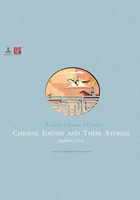
金城汤池 (jīn chéng tāng chí)
Fortress Tactics
Strategists around the world have been wracking their brains for centuries to create an impregnable defense system. The American missile defense systems are probably a good example in today’s world. However, the US plans could be deemed a mere update of an old Chinese idea of building a truly impregnable city.
An ancient version of such a defense system is described in the Chinese saying, Jin Cheng Tang Chi, meaning “a city surrounded by metal ramparts and a moat of boiling water.” This imaginary fortress was first mentioned by a politician about 20 centuries ago.
During the late years of the Qin Dynasty (221-206 BC), Wu Chen, a rebel army general, planned to conquer dozens of towns in northern China.
Despite some initial success, General Wu found himself facing a number of strongly fortified towns where imperial armies put up tough resistance against advancing rebel troops.
When the rebels put Fanyang County under siege, Kuai Tong, an eloquent politician, went to see the magistrate and convinced him that surrendering was the best way to get out of the predicament. The magistrate agreed to give up only if the rebels would guarantee the safety of his family and himself.
Kuai then called on the rebel General Wu. Kuai asked the general: “Do you intend to seize all the towns in Hebei area?”
“Yes, I do,” answered the general.
“At the moment, you could only take one town after another through fierce fighting. But I can tell you a way to grab all of them with just one strike.”
Kuai then told the general that his friend, the magistrate of Fanyang, was inclined to surrender to the rebels, but he was afraid that he would be killed like other Qin officers in fallen towns. Kuai suggested that the rebel general spare the Fanyang magistrate’s life and offer him good treatment after he surrendered. He said this would set a good example and encourage other Qin officials to follow suit.

“Otherwise,” the persuader said, “the Qin troops will turn all the towns in the Hebei area into fortresses fortified with metal ramparts and moats of boiling water.”
Since then, the expression, Jin Cheng Tang Chi, has become a popular synonym for a city believed to be impregnable.
The rebel general followed the politician’s advice and later seized more than 30 towns in northern China without another bloody battle.
The teaching behind the imaginary impregnable city story, however, is that an invulnerable defense system never exists. It’s only the people’s will and their desire to survive that will turn a mound of earth into an insurmountable mountain.